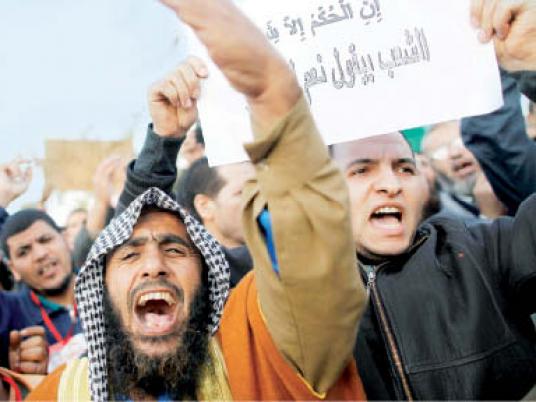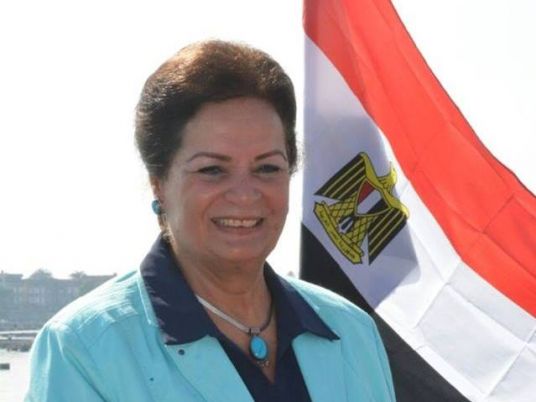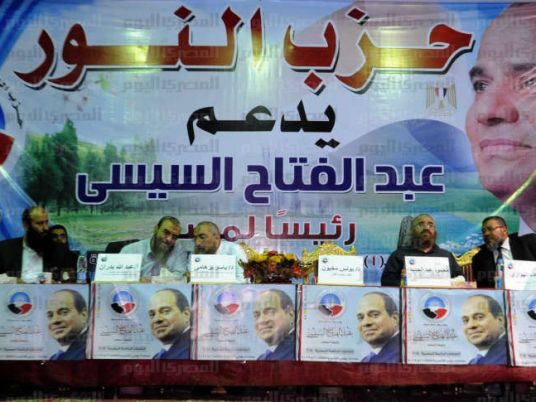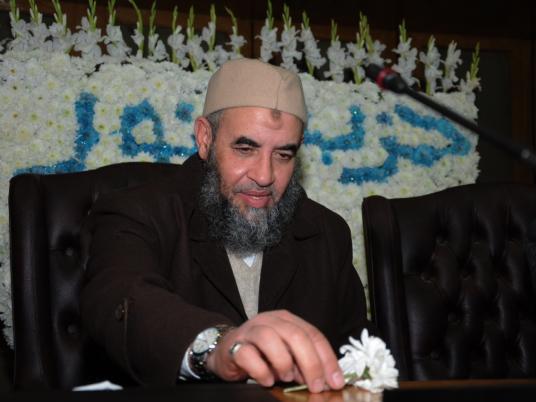
After several months of brewing internal feuds, Emad Abdel Ghafour, former president of the Nour Party, pulled out of the country’s second-largest Islamist political organization and largest Salafi party to announce the launch of his Watan Party.
In a large ceremony held earlier this month, the 52-year-old surgeon by training declared the Watan Party’s manifesto in the company of his new allies. Abdel Ghafour took everyone by surprise when he announced his alliance with the would-be Egyptian Umma Party, founded by the controversial Salafi lawyer-turned-preacher Hazem Salah Abu Ismail.
While the coalition’s leaders voice confidence that they can live up to the competition with the Nour Party, experts argue that their chances in posing a credible threat to a party that enjoys the full backing of the Salafi Dawah, a four-decade-old proselytizing organization, are minimal.
Little chance of success
“Abdel Ghafour and the group that left the Nour Party with him have no popularity on the street,” says Ali Abdel Aal, an expert on Salafi groups. “By leaving the Nour Party, they lost the popular support provided by the Salafi Dawah.”
The Nour Party stems from the Salafi Dawah, one of the best-organized Salafi entities in today’s Egypt. It was established by students at Alexandria University in the 1970s to promote an ultra-orthodox interpretation of Islam.
For decades, the Dawah preachers have propagated their message through mosque lessons, conferences, youth activities and social services. Since the 1990s, many of its preachers have become TV stars, thanks to their shows, which are regularly aired on mostly Saudi-funded satellite channels.
The movement had remained aloof from politics and even went as far as denouncing political participation. That has changed since Hosni Mubarak’s 2011 ouster. In the summer of that year, the Dawah’s political wing, the Nour Party, was granted official status.
In the first post-Mubarak parliamentary elections, the Nour Party chalked up an unexpected victory, and grabbed almost 20 percent of the votes, rising as the second largest parliamentary bloc after the Muslim Brotherhood’s Freedom and Justice Party.
Many observers had attributed this remarkable triumph to the influence of Salafi Dawah preachers and resources.
“If the Salafi Dawah abandons the Nour Party, it will fall,” adds Abdel Aal.
The Watan leaders seem quite aware of this, which explains their pursuit to form alliances with smaller Salafi networks, including the Cairo-based Salafi group led by Sheikh Mohamed Abdel Maqsoud and its political wing, the Asala Party, as well as followers of former presidential hopeful Abu Ismail.
Ahmed Badie, Watan Party spokesperson, admits that the backing of sheikhs is crucial for any Salafi party to gain people’s confidence.
“If we speak of a party with an Islamic frame of reference, we need the support of sheikhs while addressing the masses, because this is part of the culture of both the people and the society,” Badie explains.
A divorce beyond repair
Badie, a 51-year-old lawyer by training, was among the Nour leaders who defected in objection to the absence of a merit-based system within the party.
“I should not be entrusted with certain administrative tasks just because I am close to the sheikh, while another competent person gets sidelined because he not as close,” Badie says, remembering his days in the Nour Party.
Last fall, the Nour Party’s internal splits came into the limelight. Two opposing blocs had evolved: one spearheaded by Abdel Ghafour and the other by Salafi Dawah leader Sheikh Yasser Borhamy.
Accusations that Borhamy sought to tighten the clerical grip over the party and hamper internal democracy made headlines in the local press. Abdel Ghafour’s backers alleged that the internal vote was rigged to ensure the ascent of figures loyal to Borhamy.
“The role of clerics should be restricted to handing down edicts and opinions on matters that pertain to Sharia,” says Badie. “But they should not be involved in elections or day-to- day politics,” he adds.
The actual divorce between the two blocs occurred when Abdel Ghafour announced his resignation.
In the lead-up to this separation, Abdel Ghafour had groomed himself as a savvy and reformist politician who seeks to arm the Salafi bloc with people of expertise.
Unlike most Salafi leaders, soft-spoken Abdel Ghafour rarely made any inflammatory statement that might alarm non-Islamists, and sometimes struck observers with his pragmatic leanings.
Nevertheless, this is not to assume that his bloc deviated from the Nour Party ideologically.
“They all belong to the same school. We cannot say that [newly elected Nour Party President] Younis Makhyoun is more Salafi than Abdel Ghafour,” says Abdel Aal.
Like the Nour Party, Watan holds Sharia as its main frame of reference and shows some discomfort toward the final Constitution.
Badie wishes that controversial Article 2, reading “the principles of Islamic Sharia are the primary source of legislation,” would be amended to remove the term “principles.” For most Salafis, the term “principles” limits the scope of Sharia in the Constitution.
For Salafis, this term is notorious, because the Supreme Constitutional Court had once interpreted as incontestable only Sharia injunctions, dropping many commandments that remain debatable among scholars.**
“This would destroy Sharia,” says Badie.
Yet, like his Nour peers, he finds some consolation in the addition of Article 219, which provided a broader definition to the term principles.
“We could not do more than that,” says Badie.
A marriage of convenience
Abdel Ghafour’s democratic tendencies, coupled with his prudence, cast doubts over the sustainability of his alliance with Abu Ismail, who is notorious for his incendiary and confrontational discourse.
“It is not a genuine alliance,” says Ashraf El Sherif, a political scientist at the American University in Cairo. “Both Abdel Ghafour and Abu Ismail hold different views and take different stances, and each one sees himself as a leader. Hence it is very difficult for them to coordinate their efforts.”
“They have one common interest, which is defying the Nour Party,” adds Sherif, dubbing this rapprochement as “a marriage of convenience.”
The animosity between Abu Ismail and the Nour Party is related to the party’s reluctance to endorse him in the presidential poll held last summer.
The Salafi Dawah and its political wing had disapproved of Abu Ismail’s revolutionary discourse toward the then-ruling Supreme Council of the Armed Forces.
Even before Mubarak’s ouster, Abu Ismail stood as a source of embarrassment for most Salafi leaders. His televised sermons promoting rebellion against “unjust” rulers had set him at odds with most Salafi sheikhs, who had preached quiescence and warned against sedition.
Abu Ismail sent shockwaves through many segments in society with his March parade, when tens of thousands marched to the headquarters of the Presidential Elections Commission to express their support for his presidential bid. While a candidate was required to garner only 30,000 signatures to qualify, in a show of strength, Abu Ismail submitted 151,000 endorsements.
When Abu Ismail was disqualified later on grounds that his mother held dual citizenship, many of his followers alleged that his exclusion from the race was the outcome of a conspiracy mounted by the generals, the West and envious Salafi sheikhs.
It is on Abu Ismail’s wide appeal, revealed last spring, that the Watan Party is betting.
“Sheikh Abu Ismail has a lot of followers and a large support base among youth. He is phenomenal,” says Badie.
Yet this support base might not be enough to beat the two Islamist giants, the Muslim Brotherhood and the Salafi Dawah, in the upcoming vote.
“No matter how powerful Abu Ismail is, he cannot compete fiercely in the elections,” says Abdel Aal.
Besides Abu Ismail’s party, the Cairo-based Salafi Asala party and the Islamist New Labor Party have joined Watan’s coalition.
Badie says his party is still holding talks with the moderate Islamist Wasat and Hadara parties, as well as Jama’a al-Islamiya’s political wing, the Construction and Development Party, to persuade them to join.
Local press had quoted anonymous sources as saying that the FJP was interested in forming an alliance with Abdel Ghafour’s party. However, Badie ruled out such a pact.
“It is always hard to form coalitions with ruling parties,” he says. “The FJP has a certain plan: Whoever wants to form a coalition with it has to accept all its conditions.”
Last year, the Nour Party, under Abdel Ghafour’s leadership, had pulled out of the FJP-led Democratic Alliance ahead of the legislative poll, complaining that the Brotherhood wanted its party to have the lion’s share of the candidates list.
Watan has not yet acquired official status. Badie says they should submit all required documents to the Political Parties Affairs Committee next week.




